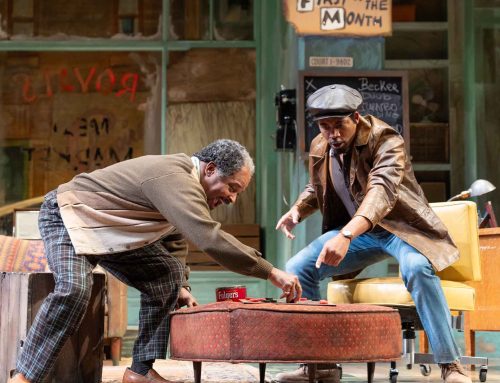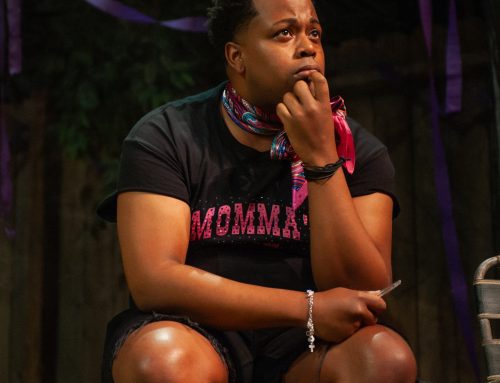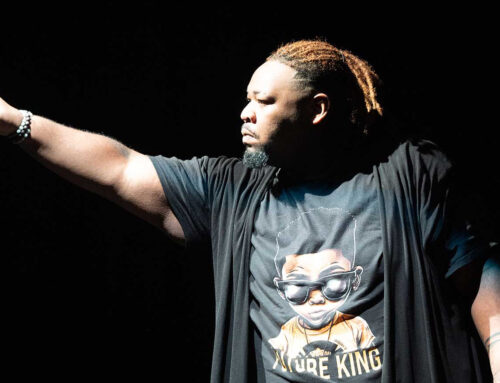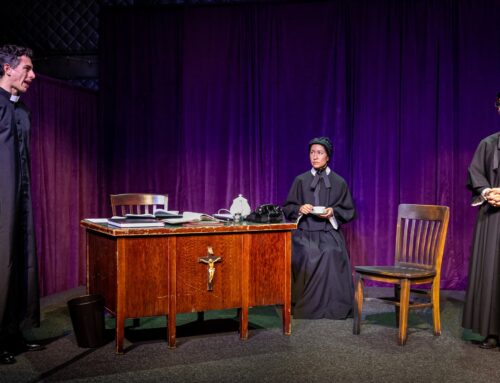at the Oregon Shakespeare Festival

Director and future Artistic Director Bill Rauch found ways to make this classic fresh and standout from the pack of “another Romeo and Juliet“. Rauch’s creativity augers well for his upcoming run as the festival’s Visionary In Chief.
This is a fast-paced R&J, and it is viewed with a generation gap at the center of the drama. The parents’ generation is decked out in old fogy Elizabethan grab while the young adults and town folk are with-it, modern, dressed as prep school students and in current-day suits.
The parents are stuck in older ways. Their determination to perpetuate the long-running family feud is more important to them than their children. The story plays out.
This production delivers more monologues than most. These musings are clear and add meaning, making the audience wonder why they’ve been cut before.
The party and brawls, too, are crisp. Sides are obvious, and there’s no tangle of theatrical-looking robes which often creates only a confusing blur in other R&J’s. Dan Donohue’s Mercutio slows down speeches often delivered in angry torrents; he plucks meaning from the text.
Each word in the balcony scene makes complete sense. The dawdling and repeated hesitation is played straight, and that approach is so much stronger than the often staged approach of trying to make the couple seem farcically unable to make up their minds. Romeo engages the audience in his indecision, agony, and elation. (Romeo is actually IN the audience for some of the scene!) Pauses in the back-and-forth R&J dialog work.
Mark Murphy’s Friar Lawrence has a coherent independent character. This cleric controls the scenes with Romeo.
Demetra Pitman as Juliet’s nurse handles each of the speeches, moods, and turns as an integrated force. As the plot twists, she doesn’t. There is a center to this woman and this nurse is not just cut-out comic relief who has a few ugly lines toward the end that we need to gloss over.
Rafael Untalan’s as Juliet’s approved suitor, Paris, is open, obvious, and real. The part is played as a reasonable matchmaking choice. We understand he is a catch, and not just a toady promoted by an callous parent. This subtlety intensifies the problem of Juliet’s crush on Romeo.
Crush? Yes, crush.
This Romeo and Juliet coupling is no mature love. This is teenage infatuation and idealized love experienced by two pretty, presentable young people.
Juliet has her moments of personal depth, but Jonathan Tufts’ Romeo gave the impression that while he was going to kill himself in a self-centered moment of melodrama over losing Juliet, had he lived he could the next week have been back to Rosalind. In a park talk, Tufts explained that his Romeo was in a romantic comedy that unexpectedly ended badly. That’s an interpretation which works wonderfully and reinforces the desperately sincere teenage nature of these central characters.
These kids were cute, but clean and not intricately intertwined with each other. They’re in teenage physical and emotional lust.
Christine Albright’s Juliet meaning from each of her speeches that shows understanding and craftsmanship. Tufts is perfectly fine in each on stage appearance and also on target with his lines.
Yet, this production doesn’t have Romeo and Juliet at its center. The families and the estrangements are the focus, and the children are the tragic at-hand examples of the rift.
Very interesting. Very well done.
Ozdachs Rating: ![]()





I’m ashamed she’s a UU. The woman is clearly round the twist. It seems mean to make fun of her like this.